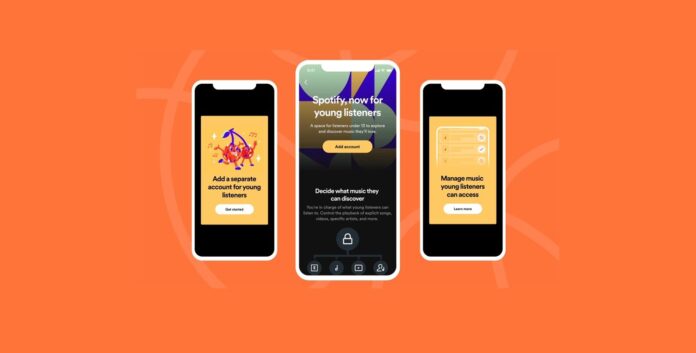Following the moves of other tech giants, Spotify announced on Friday it’s introducing in-app parental controls in the form of “managed accounts” for listeners under the age of 13. The new feature will initially be offered as a pilot program for parents or guardians on a Family plan in select markets, including Denmark, New Zealand, and Sweden.
Once enabled, parents can manage the account of young listeners on their account by preventing them from watching videos, playing content, or even viewing Canvas videos — the looping videos that accompany music playback — for any content that’s labeled explicit. In addition, parents will be able to use a new control feature to decide if their child can play certain artists or tracks. This allows the parent or guardian to make more granular decisions about what kind of music is available to their child, without forcing their tween to use the more kid-friendly, but also more restrictive, Spotify Kids app.

The launch follows efforts from other large tech companies including TikTok, Meta, Snap, and YouTube to give parents more control over how their kids use their apps, and what sort of features kids have access to, driven by increasing pressure from regulators to reign in Big Tech. Other streamers, like Netflix, Max, and Hulu, among others, also offer parental controls to parents.
Though Spotify is not a TV and movie streaming service or a fully featured social app, it does have a wide variety of content on its platform, some of which may not be appropriate for younger listeners.
Parents who today share an account with their kids may also be prompted to switch to a Family plan, as each account under the plan will have its own separate recommendations. That means parents’ musical tastes won’t be mixed up with their tweens’, and vice versa. This will make Spotify’s end-of-year Wrapped results more accurate, Spotify notes.
Access to the new feature is available to parents from the Accounts page in the app, where they’re able to select the option to “Add a listener aged under 13,” (or the market equivalent), then follow the instructions to navigate the various options.










![Best Weight Loss Supplements [2022-23] New Reports!](https://technologytangle.com/wp-content/uploads/2022/12/p1-1170962-1670840878.png)




